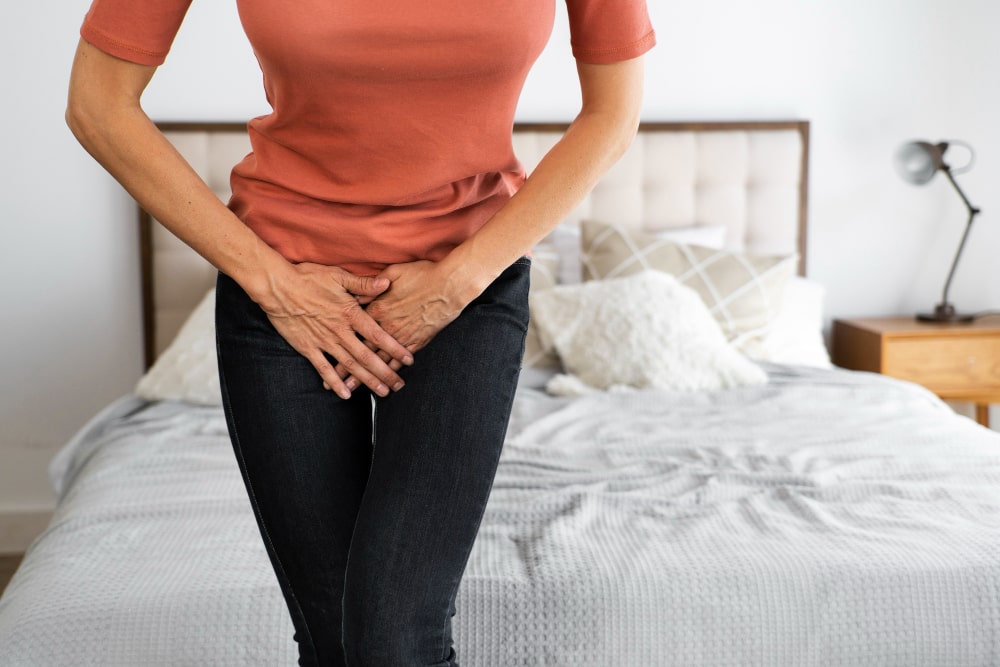Have you recently experienced sharp pain in your vagina? Are you wondering what could be causing it and how it can be treated? Pain in the vagina is no joke – it can range from mildly uncomfortable to severely debilitating, and if not addressed properly, it can lead to other health concerns. In this article, we will discuss vaginal anatomy, common causes of sharp pain in vagina, associated symptoms, diagnosis and treatment options. We will also provide tips on prevention and self-care measures. With this knowledge, you can take steps to manage your vaginal health better.
What is Vaginal Anatomy?
The vagina is a part of the female reproductive system. It is a muscular canal that runs from the cervix to the outside of the body, providing a passageway for menstrual blood and allowing intercourse and childbirth to take place. The walls of the vagina are made up of several different layers of tissue, including mucous and skin cells. In between these layers lie nerves, muscles, and other tissues that can be sensitive to pain when irritated or inflamed. When it comes to sharp pain in vagina, it could cause by any number of underlying conditions.
Read More: Can Gallbladder Cause Back Pain: Causes, Symptoms, Cure
Common Causes of sharp pain in vagina
Vaginal infections are one of the most common causes of sharp pain in vagina. These infections can range from mild yeast infections to more serious bacterial infections like chlamydia or gonorrhoea. Symptoms of a vaginal infection may include itching, burning, and an unpleasant odour or discharge.
1) Urinary Tract Infections
A urinary tract infection (UTI) is caused by bacteria that enter the bladder through the urethra. Symptoms of a UTI include a burning sensation when urinating, as well as fever, abdominal pain, and cloudy urine.
2) Vaginal Infections
Vaginal infections are caused by an overgrowth of certain organisms, such as fungi or bacteria. Common symptoms of these infections include itching, abnormal discharge, painful intercourse, and irritation around the vagina.
3) Pelvic Inflammatory Disease
Pelvic inflammatory disease (PID) is an infection of the reproductive organs, usually caused by a sexually transmitted infection. Symptoms of PID include fever, abdominal pain, and a discharge with an unpleasant odour.
4) Endometriosis
Endometriosis is a condition in which endometrial tissue grows outside of the uterus. This can cause painful menstrual cramps as well as sharp pain during sexual intercourse and even when walking or sitting for long periods of time.


Read More: Diarrhea While Breastfeeding: Causes, Remedies, Precautions
5) Ovarian Cysts
An ovarian cyst is an accumulation of fluid within the ovary that can cause mild to severe pelvic pain. The pain may be sharp or dull and may last for days or weeks at a time.
6) Fibroids
Fibroids are noncancerous growths in the uterus that can cause sharp abdominal pain and heavy menstrual bleeding. They can also lead to painful intercourse or urinary problems.
7) Vulvodynia
Vulvodynia is a chronic condition characterized by persistent burning, stinging, or itching around the vagina. The pain may localize or widespread and can range from mild to severe.
8) Musculoskeletal Issues
Musculoskeletal issues such as herniated discs, sciatica, or pelvic floor muscle tension may cause sharp pain in vagina due to pressure on surrounding nerves and muscles.
9) Sexual Dysfunction
Sexual dysfunction may cause sharp pain in vagina due to difficulty with arousal or orgasm.
10) Postmenopausal Atrophy
Postmenopausal atrophy is caused by a decrease in the production of estrogen, which can lead to thinning and dryness of tissues in the vagina, resulting in pain during sex or other activities.
Read More: Back Pain When Breathing Deeply: Causes, Symptoms, Cure
Symptoms Associated with Vaginal Pain
The most common symptom associated with vaginal pain is a burning sensation, especially when urinating. This can be accompanied by itching or irritation and an unpleasant odour.
Burning Sensation: Burning sensations in the vagina can range from mild to severe and are often accompanied by other symptoms such as itching or irritation.
Itching or Irritation: Itching and irritation around the vulva are also typical symptoms of vaginal pain. This may occur due to an infection, friction due to tight clothing, or activities such as cycling.
Abnormal Discharge: Abnormal discharge from the vagina is a sign of an infection and may be accompanied by itching or an unpleasant odour.
Painful Urination: Painful urination can occur when bacteria enter the bladder, causing urinary tract inflammation. This can lead to sharp pain when urinating and increased frequency and urgency.
Painful Intercourse: Pain during sexual intercourse may cause by vaginal dryness, musculoskeletal issues, endometriosis, ovarian cysts, fibroids, or pelvic inflammatory disease (PID).
Pelvic Pain: Pelvic pain is another symptom associated with many of the conditions mentioned above. The pain may be sharp or dull and may last for days or weeks at a time.


Read More: Sharp Breast Pain: Causes, Symptoms, and Treatment Options
When to Seek Medic Help
If you are experiencing any of the signs listed above, it is important to seek medical help as soon as possible. In some cases, such as infections, prompt treatment can help prevent further complications. A doctor can diagnose the underlying cause of your vaginal pain through medical history, physical examination, laboratory tests, imaging studies, and endoscopic procedures.
Diagnosis of Vaginal Pain
The first step in diagnosing vaginal pain is taking a detailed medical history that includes questions about the duration and severity of symptoms and any recent changes in lifestyle or diet. The doctor may also perform a physical examination to check for signs of an infection, such as swelling or redness of the vulva area.
Laboratory Tests: Laboratory tests can identify infections and other underlying conditions that may be causing your pain. Common tests include urine and blood tests, cultures and Pap smears.
Imaging Studies: Imaging studies can help doctors diagnose musculoskeletal issues or fibroids using X-rays, CT scans, or ultrasounds.
Endoscopic Procedures: Endoscopic procedures such as hysteroscopies and laparoscopies are sometimes used to evaluate the inside of the uterus and other organs to diagnose endometriosis or other conditions.
Read More: What Causes Pain Above Belly Button When Pressed?
Treatment Options for Sharp Vaginal Pain
The treatment for sharp vaginal pain depends on the underlying cause and may include medications, lifestyle changes, or surgical procedures.
- Medications: Your doctor may prescribe antibiotics to treat an infection or anti-inflammatory drugs to reduce inflammation. Hormonal birth control can also help regulate hormones and ease pain associated with endometriosis.
- Antibiotics: Antibiotics can treat infections caused by bacteria, such as pelvic inflammatory disease.
- Anti-inflammatory Drugs: Anti-inflammatory drugs can help reduce inflammation in the area and ease discomfort associated with musculoskeletal issues or endometriosis.
- Hormonal Birth Control: Hormonal birth control may prescribe to regulate hormones and reduce pain associated with endometriosis.
- Lifestyle Changes: Making lifestyle changes such as exercising regularly, eating a healthy diet, quitting smoking, and avoiding alcohol can help manage symptoms of vaginal pain. You may also want to wear loose-fitting clothing and avoid activities that put pressure on your pelvic area.
- Surgery: In some cases, surgery may be necessary to remove fibroids or other growths that are causing the pain. Other surgeries, such as hysterectomy and ovarian cyst removal, may also be an option for some women.
- Physical Therapy: Physical therapy can strengthen the pelvic floor muscles and reduce pain associated with musculoskeletal issues. Your doctor may refer you to a physical therapist who specializes in treating pelvic pain.
Prevention and Self-Care Tips:
Prevention and self-care can help reduce the risk of developing vaginal pain or make symptoms more manageable. Here are a few tips to keep in mind:
Practice Good Hygiene: Good hygiene, such as showering daily and changing sanitary pads regularly, can help prevent infections that may cause sharp vaginal pain.
Avoid Scented Products: It is important to avoid scented products, including laundry detergents and body sprays, as they can irritate the delicate skin of the vulva.
Wear Loose-Fitting Clothing: Wearing loose-fitting clothing that does not rub against the vagina can help reduce irritation and discomfort.
Practice Safe Sex: Practicing safe sex, such as using condoms, can help reduce the risk of developing infections.
See a Doctor: Seeing a doctor if you experience any symptoms of vaginal pain is important to receive prompt treatment and prevent further complications.
Take Care of Yourself: Taking care of your overall health by eating a balanced diet, getting plenty of rest, and exercising regularly can help reduce your risk of vaginal pain.
By following these tips, you can help reduce your risk of developing sharp vaginal pain or make symptoms more manageable if they occur. However, it is important to seek medical attention if you experience any concerning symptoms to receive a proper diagnosis and treatment.
Read More: Throbbing Pain After Root Canal : Causes, Symptoms, Prevention
How to Manage Vaginal Pain at Home
In addition to seeking medical help, there are several home remedies that can help relieve vaginal pain. These include:
- Applying a cold compress to the area
- Taking over-the-counter ache relievers such as ibuprofen or acetaminophen
- Avoiding activities that cause discomfort or irritation
- Wearing loose clothing and cotton underwear
- Practising relaxation methods such as yoga or meditation
Ultimately, it is important to consult your doctor if you experience any sharp vaginal pain to determine the underlying cause and receive
Conclusion
In conclusion, sharp vaginal pain can cause by various underlying causes and should always evaluate by a medical professional. However, there are several home remedies that can help reduce the discomfort associated with this condition as well as some preventive measures that can help minimize the risk of developing it in the first place. With prompt diagnosis and proper treatment, you can manage your symptoms and enjoy a more comfortable life.
Read More: Sudden Sharp Stabbing Pain in Eye: Causes, Symptoms, Cure
FAQs
A: If the sharp pain persists or worsens, it could be a sign of a more serious issue and should not ignore. Contact your healthcare provider immediately for an evaluation and diagnosis if this occurs. You should also seek medical attention if you are experiencing pelvic pain that is accompanied by fever, abnormal bleeding or discharge, persistent nausea or vomiting, painful urination, or other unusual symptoms.
A: There are a variety of things you can do to manage discomfort caused by sharp pain in vagina. The first step is to seek out medical advice to determine the source of pain and get an appropriate diagnosis. Once the cause has been identified, treatment options may include medications, pelvic floor physical therapy, lifestyle modifications, or other forms of therapy. Additionally, avoiding certain activities that could be causing or exacerbating the pain and taking over-the-counter medications such as ibuprofen or acetaminophen can help reduce discomfort.
A: During a doctor’s visit for sharp pains in the vagina, your physician will likely ask you questions about your symptoms and medical history and perform a physical exam. Depending on the source of the pain, you may also refer to a specialist for further testing or imaging. Treatment recommendations will be based on the results of your evaluation and may include medications, lifestyle changes, physical therapy, or other forms of therapy.
A: It is important to seek medical advice if you experience sharp pains in the vaginal area, as it could be a sign of an underlying condition needing treatment. Long-term effects depend on the cause and can vary from person to person. However, without proper diagnosis and treatment, these effects could become more severe over time. Consulting with your doctor can help ensure that any underlying conditions are identified and treated promptly.

